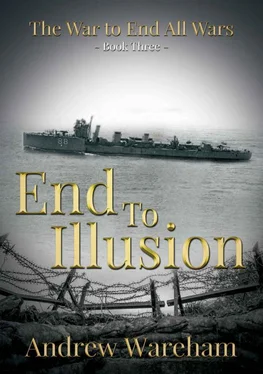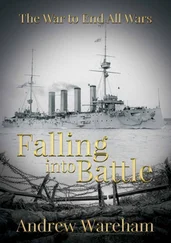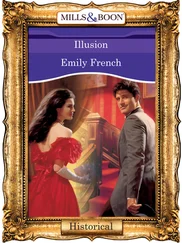Christopher spoke to Barclay later, confirming that they had no rifles aboard.
“No. I put in an indent for them but nothing had turned up when we sailed.”
Ephraim was close to, overheard the conversation.
“I’ll speak to the captain. We need something in case we have to board a sub we have disabled.”
That seemed rather ambitious. They agreed politely.
Captain Hamworthy was not pleased. He wondered whether they should return to Valetta, decided that might be to show unwilling to serve.
“Speak to the trawlers, Mr Ephraim, see if they have anything aboard.”
Hans Heine, senior of the three, had two rifles; Kiel had four; Dorothea reported a dozen crates sent aboard immediately before sailing and unopened, possibly small arms.
“Bloody fools could have told us!”
Fanny Brown slowed for Dorothea to come alongside and tranship the crates. The merchant navy crews made quick work of dropping a cargo net from the larger ship and loading the crates in and winching them aboard.
“Surprising set of skills your people have, sir.”
Ephraim nodded, a grin splitting the black beard.
“Used to it, Adams. They were used to load a score or two of crates of whiskey at Halifax and drop them off to inshore drifters off the Mersey, so they tell me. Made their pocket money for a run ashore in Liverpool. Every man aboard would see something in his wallet.”
“Not a naval habit, sir. Useful set of skills, however!”
Barclay set to opening the crates and sending their contents down to his workshop.
“Eighty service rifles, Mr Ephraim. Two hundred rounds apiece. Pouches and webbing belts. Spare clips. Bayonets, eighty again. Cutlasses. Also eighty.”
“Cutlasses.”
“Yes, sir. The Admiralty is a firm believer in the cutlass, sir. Comes of reading pirate stories, sir.”
“Jolly good show, old chap. I shall ask the captain what to do with the cutlasses – as senior naval officer, I am sure he will have some very good ideas.”
They waited hopefully for the captain’s response. Ephraim came back laughing.
“I told him they would not fit there, Adams. Mr Barclay, tuck the cutlasses away where the sun does not shine. You must have a dark corner in your domain.”
“Aye aye, sir. Total of twenty-eight hands other than gun crew and hydrophonists, sir. Each to be trained with a rifle?”
“Issue one to each man, including the specialists. Ten each to the trawlers, and ammunition. Remainder to be racked within reach of the guns, against need. Spend an hour a day on each trawler, if needed. The naval ratings should know their way round a three-o-three and can teach the merchant navy men. You just need to supervise them, get them started.”
“Give me something to do, sir. What sort of drill?”
Ephraim had no idea.
Christopher caught his eye.
“Just the basics of loading and firing, Guns. No drill as such. We ain’t Whale Island. Simply how to tuck the butt into the shoulder, breathe out and squeeze the trigger then work the bolt quickly. No marching; no parade stance; no saluting.”
“Takes the fun out of it, sir. Just civilians with guns, not proper bluejackets, they’ll be.”
“That’s all we want, Guns. Effective if they are forced to be.”
Barclay left for his workshop to commence the stripping down and cleaning of the rifles, all of them still covered in factory grease.
“What was that about, Adams?”
“The gunnery instructors love to drill the men, parade ground style – all bull and blanco. Totally pointless stuff!”
“No place for it at sea. Not in our ships.”
“Probably no use for the rifles, sir. As well to have them just in case.”
“In case of what, Adams?”
“Good question, sir.”
The crawled across the Ionian Sea and poked their nose up into the Adriatic. The hydrophone operators heard nothing other than the sounds of the trawlers.
“At least we know the machines are working, sir. They can hear the noises that are available.”
That was small consolation for five wasted days. Captain Hamworthy and Ephraim were both concerned that the squadron should be seen to be active, though not necessarily for the same reasons.
“What about we venture up the Adriatic and hang about off one of the Austrian navy’s known bases, Adams?”
“In a ship that can make ten knots, sir? With destroyers and cruisers good for thirty and likely to spot us quite quickly? We were chased off very rapidly in Connaught and had to use the big guns to discourage the pursuit.”
They knew the size of Connaught’s guns.
“Scrub that idea. We have to do something that at least appears useful.”
“Go to the convoy routes from Malta to Mudros, sir? Patrol them hopefully, there and back again and then return to Malta for coal. Follow that by a run to Gibraltar and patrol the straits off Gib for a week before returning to Malta again. That will use up six weeks, if we are careful. If no joy, then we could patrol the track to Alexandria, and north to Cyprus. Then up to the Dardanelles and back again. Should be able to work some yard time in Alex, sir.”
Hamworthy could see virtue in that proposal.
“’When in trouble, when in doubt, run in circles, scream and shout.’ If we don’t know what we are doing – then make a lot of noise about it and seem furiously active. It normally works, Adams. Sounds good to me. Course to intercept a sensible route from Malta to Mudros and then follow our noses, Adams. Have we seen any fishing boats lately?”
The change of subject confused Christopher. He wondered what they had to do with submarines.
“Nothing. I just fancied fresh sardines.”
“I shall give the order to look out for boats, sir.”
“Very good, Adams. Put the change of course into effect first.”
Fanny Brown turned her head southeast and searched diligently along the convoy lanes. There was nothing to be found. She did discover a fleet of Italian fishing boats and bought fresh fish, much to the approval of all – their cooks, hired Maltese civilians, were good with seafood.
“We know there are submarines, both Austrian and German, working these waters, so why are we not finding them, do you think, Adams?”
Ephraim was puzzled and wanted to do his bit for the war effort. He was genuinely distressed that four ships and some two hundred men were contributing nothing.
Christopher had given some thought to that question, had a few ideas.
“Fanny Brown is big and old and noisy. Ancient triple expansion steam engines, banging and rattling with a score of stokers heaving coal and a big old propeller thrashing around. Add to that three trawlers, all making their own noises. The submarines have listening gear and we are making a lot more noise than a little boat with an electric motor. We can assume that they will have been sent out with orders to target troop convoys. A little auxiliary cruiser accompanied by three small ships is not much of a target compared to a fat convoy. I suspect – without any evidence, any proof at all – that they hear us before we hear them and quietly sneak away from our vicinity. German Intelligence is said to be active in Malta. They probably know all about us, know that we are submarine chasers, and have passed the word to stand well clear. No certainty, can’t have, but I would not mind betting that we have been spotted more than once and that the Hun has run to pastures greener.”
It was very likely, Ephraim was forced to admit.
“What can we do?”
“Nothing in this ship, sir. Nothing at all. Too slow and too big. A silent and faster small ship might do the job, but I suspect it is the wrong job. Rather than sending out chasers to seek out submarines, why not make the submarines find us? Put Fanny Brown at the head of a convoy, listening for subs coming in to target the troopers behind us.”
Читать дальше












